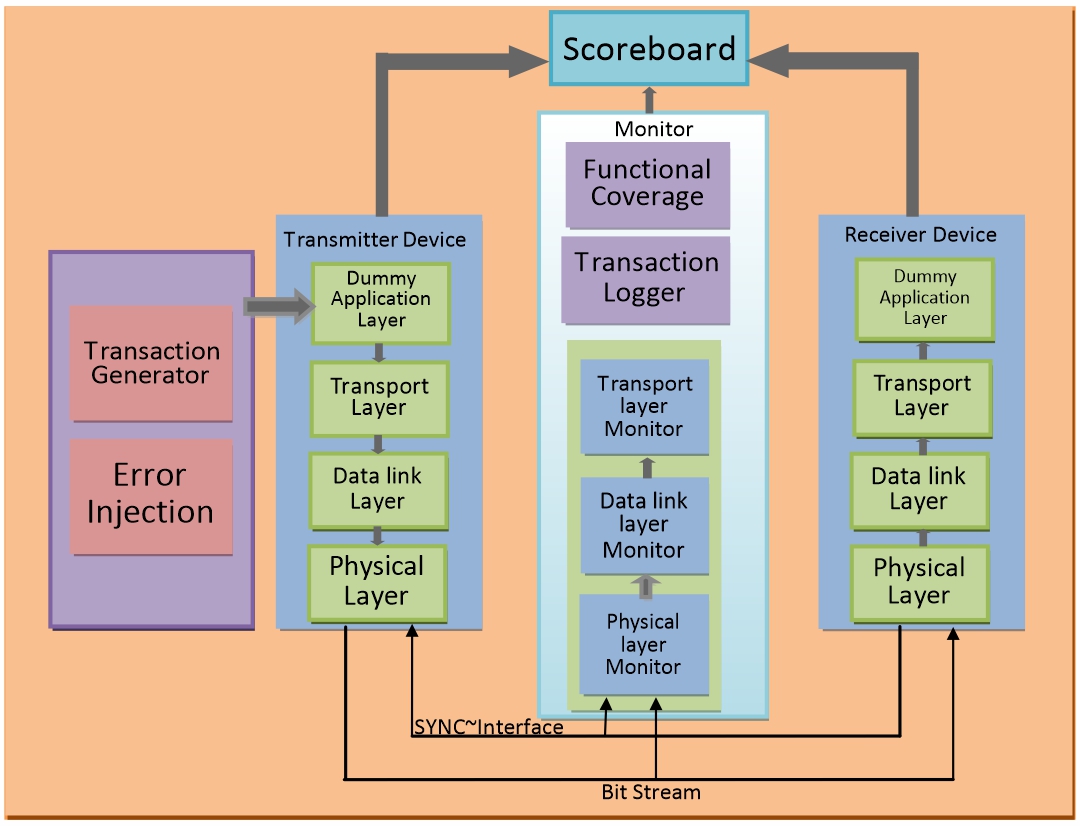JESD204D Verification IP
Truechip's JESD204D Verification IP provides an effective & efficient way to verify the components (data converters and/or logic devices) connecting with JESD204C link.
Truechip's JESD VIP is fully compliant with standard JESD204D specification from JEDEC standard. This VIP is a light weight VIP with easy plug-and-play interface so that there is no hit on the design time.
Key Benefits
- Available in native SystemVerilog (UVM/OVM/VMM) and Verilog
- Unique development methodology to ensure highest level of quality.
- Availability of Compliance & Regression Test Suites
- 24X5 customer support
- Unique and customizable licensing models
- Exhaustive set of assertions and cover points with connectivity example for all the components
- Consistency of interface, installation, operation and documentation across all our VIPs
Features
- Truechip JESD204D VIP is compliant to the latest JESD204D,C.01,C &B specification by JEDEC
- It is also backward compatible with all the previous versions of JESD204
- Supports a wide range configurations for data converter devices
- Over single and multiple serial links with each link can support single or multiple lanes as per requirements
- Supports serial data rates up to 36 Gbps
- Support physical layer (PHY) classes
- FEC support will be there as per requirement, users can enable and disable
- Multiple FEC Modes are supported with respect to PHY Classes
- One or more convertor devices are supported
- Supports configuration variants:
- Single vs. multiple converters per converter device
- Single lane vs. multiple lanes per converter device
- Single converter device vs. multiple converter devices connected to one logic device
- Supports all working modes:
- Data mode vs. test mode
- Active mode vs. idle mode
- Supports all class devices for B category like B-3, B-6, B-12
- Supports all class devices for C category like, C-S, C-M, C-R
- Supports all Subclasses and ability to support Deterministic latency in Subclass 1:
- Subclass 0 also which is intended for interfacing to JESD204A
- Subclass 1 for RS-FEC link layer (64/66 & 8b/10 also for old compatibility)
- Subclass 2 for 8b/10b link layer(not in 204D for backward compatible)
- Subclass 3 for RS-FEC link layer
- Supports generation of SYSREF or MULTIREF and using them in alignment of LAC(LMFC/LEMC)
- Alignment of LMFC using SYNC~ also supported for device subclass 2
- Supports transport layer mapping as per JESD204C protocol
- Supports oversampling during transport layer mapping
- Supports 64B/80B and 64B/80B link layer with the following Features:
- 64B/66B and 64B/80B encoding
- Sync header stream provides transmission of information parallel to the user data
- Additionally CRC-12 / CRC-3 for error detection, Forward error correction (FEC) for error detection, correction, reporting and command channel for transmitting commands and status information
- Sync header alignment and Extended multiblock alignment at receiver
- 8B/10B link layer is also supported
- Supports both “hard-wired” SYNC interface and “soft” SYNC interface and SYNC interface is compatible with JESD204A & JESD204B
- Supports combined and non-combined SYNC~ signaling for 8B/10B link layer
- Frame and lane alignment and monitoring is supported
- Hard wire and soft sync interface is supported
- Supports up to 32 lanes
- Scrambler can be enabled or disabled
- Supports easy configurations and err-injection scenarios
- Supports functional coverage with bus coverage and configuration coverage
- Supports comprehensive compliance test suite, Constraint random test cases and error injection test cases for verification
- Supports strong protocol monitoring and checks
- Supports transaction logger with the option of GUI
- Supports strict assertion checks.
Deliverables
- Transmitter and Receiver Device Agent
- Monitor and Scoreboard agent
- Test environment and test suit
- Basic and directed protocol tests
- Random Tests
- Error Scenario Tests
- Assertions & Cover P Tests
- Integration guide, user manual, release notes, ppt for integration of User’s DUT in VIP environment and integration of VIP in user’s SoC environment


